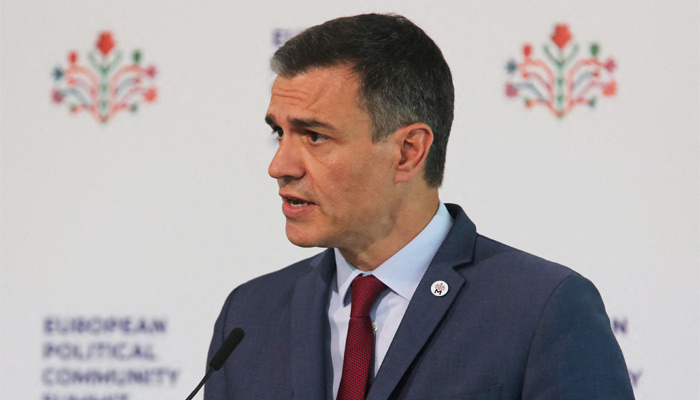Spain’s Election Won’t Disrupt EU Presidency, Says PM Pedro Sánchez
Upcoming elections in Spain are set to take place mere weeks after it takes over at the helm of the Council of the EU.
Spanish Prime Minister Pedro Sánchez downplayed the prospect that snap elections would disrupt Spain’s upcoming Council presidency as he emphasized making EU reindustrialization his central ambition.
Spain takes over the rotating presidency of the Council of the EU for six months on July 1 — just three weeks before holding national elections on July 23, which Sánchez called after a miserable defeat of his socialist party in regional and local elections last month.
“Democracy is never a problem,” he said in Madrid, defending the upcoming national vote as he announced Spain’s plan for the presidency. “It’s not the first time in Europe that elections take place during a rotation. There have been changes of government as well,” he said. He underlined how Spain has been preparing for its presidency the past year with “all the institutional, social and political actors.”
Sánchez, who is scrapping for his political survival against a possible coalition between Spain’s right and far-right parties, made a show of refusing to be drawn into national politics during the 45-minute press conference.
In the Valencia community, one of Spain’s 17 autonomous regions, the Popular Party and far-right Vox have just announced a power-sharing deal; it’s also a consideration in several other communities across Spain.
Asked about the rise of far-right, Euroskeptic political parties across the Continent, Sánchez said: “Having political movements that question or deny challenges like climate change, or the real threat we face on the eastern front — which is precisely a questioning of the borders and security of Europe — is bad news for the entire European Union.”
The prime minister described the four priorities of the Spanish presidency: reindustrialization of the EU to make it less dependent on foreign manufacturers; the green transition; social rights and welfare; and making the EU a key geopolitical player to rival China and the United States.
The Iberian country will also try to seal deals on key pieces of EU legislation, such as a new migration and asylum pact and reform of the electricity market while maintaining support for Ukraine in its war against Russia, Sánchez said.
Spain will arrange a major EU summit with Latin American countries next month, at a moment when the European Commission is trying to wrap up a mammoth Mercosur-EU trade deal by year’s end.
In a brief moment of unity during furious campaigning, the Spanish presidency’s unveiling was attended by other senior ministers from the coalition government Sánchez has led since 2018. These included Second Deputy Prime Minister Yolanda Díaz, who is leading a new left-wing coalition bloc called Sumar — which, along with left-wing party Podemos, is designed to create a united front against the conservative People’s Party, which is currently leading the polls in Spain.
After unveiling a new logo and website for the presidency, and playing a slick promotional video set to flamenco music, Sánchez characterized Spain’s relationship with the bloc since joining in 1986 as “profoundly pro-European.” Spain has modernized and now sees itself as “equal to equal” with the most developed member countries, he added.
“Europe was our door to modernity and to democracy in our country,” he said. “And now has come the time that we show the world how much Spaniards can do for this European Union,” said Sánchez.
Whether Sánchez himself will be part of that presidency remains to be seen.

